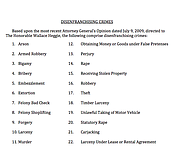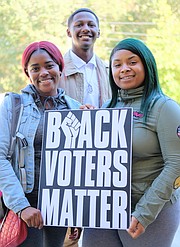Monday, November 5, 2018
Tougaloo students Samys Douglas, Zarius Holliman and Twanesha Jones have all drawn inspiration from their college to vote on Nov. 6. Photo by Delreco Harris.
Samys Douglas, a 19-year-old sophomore at Tougaloo College, could not stop dancing at a Nov. 1 Black Voters Matter Rally at her school.
She said specifically being at Tougaloo, the historically black private college in Tougaloo, Miss., just north of Jackson's County Line Road, sparked her interest in voting.
"Growing up, I really didn't care about voting as much because I felt like my voice really didn't matter—like that one vote really didn't matter," she said. "But, now that I came to an HBCU, and I see how important it is for all black people to vote, and that the man that's in office right now is not good for our community, I feel like my voice will change something, and that I do matter."
Douglas said no candidate had caught her, yet, but she hopes one will by Tuesday.
The Friday before Election Day the People's Advocacy Institute, MS M.O.V.E and Black Voters Matter descended upon Tougaloo College to get students excited about voting right there on their historic campus Tuesday, as the college is a poll site. Organizers blasted rap music, handed out rubber Black Voters Matter wristbands, and took photos of students hoisting up Black Voters Matter banners.
'Some of Us Can't Vote, Right?'
Rukia Lumumba began her remarks referencing the 22 felonies that permanently disenfranchise Mississippi voters.
"Some of us can't vote, right?" she said.
The list of 22 disenfranchising crimes from 1890 means an estimated 218,181 people in the state are unable to vote. Felony disenfranchisement still disproportionately affects African Americans in the state—2016 numbers show that nearly 16 percent of the black electorate in the state are disenfranchised.
The laws, listed in the Constitution, were enacted specifically to keep black people from exercising their right to vote. In addition, many former felons are unaware of whether they can get their right to vote back.
Lumumba said she encourages everyone to vote if they can, but she is sensitive to why people do not.
"Sometimes people have experiences in life that have persuaded them that it doesn't matter," she said. "I think that some of their concerns are valid. When we have an electoral college that can determine who the president is, when the popular vote says it should be someone else, I'm questioning the vote, too, and whether my vote matters."
Still, Lumumba hopes people find other ways to get their voices heard through processes like People's Assemblies, for example.
'Every Vote Counts, and Mine Is Going to Count'
A chant broke out at a Tougaloo College rally to inspire students on the historically black campus to vote on Nov. 6.
"When they go low, we go vote!"
Twanesha Jones, a 21-year-old sophomore from Chicago, said this upcoming election will be her first time voting. Like Douglas, Tougaloo motivated her to get to the polls.
"Back at home, they really ain't care about voting as much as they do here—Tougaloo and Mississippi," she said. "For me, this being my first time voting, every vote counts, and mine is going to count."
Jones liked that U.S. Senate candidate David Baria, a Democrat, had come to Tougaloo.
"I like how when he came up here he was all about education and trying to make everything not all about racist stuff," Jones said. "I don't know why they put Trump up in there, but it's like everybody is mad Trump is in office, but nobody wants to go vote, you feel me?"
Zarius Holliman, 21, is senior class president, and has been encouraging his peers to cast their votes on Tuesday.
"It's our last year, and the real world is about to hit us so, we're going to need to vote," he said. "We control who gets into office, and we control who makes the rules for us and sets everything up for us. So we need to get out and vote."
Like many other students, he said he didn't get into politics until he got to Tougaloo.
"They look at us like we're the lowest of the low, and we've got to speak out and get our voices heard," he said. "Voting is a big way to get our voices heard and let them know that we are here, and we're not just sitting back and letting things happen. ... We're about to step up as black people."
Holliman wasn't excited about a particular candidate, either, but more so about the electoral process.
"Voting is the most important thing at first, seeing who you're voting for, actually listening to the candidates, that comes second," he said. You have to be willing to vote first, and then you can get all into it."
Cassandra Welchlin, convenor of the Mississippi Black Women's Roundtable and co-founder and director of the Mississippi Women's Economic Security Initiative, said the millennial vote is key to every election. But, in Mississippi in particular, Welchlin said it is "in the DNA of millennials in this state from the foundation."
Long Legacy of Student Activism
Tougaloo boasts a long legacy of student activism from sit-ins to protests. In the 1960s, Student Nonviolent Coordinating Committee members Bob Moses and James Lawson held voter registration and nonviolence workshops on campus.
Welchlin was not surprised that Tougaloo students were excited about voting, but not about any of the candidates in particular.
"What I do know is that millennials and these young voters want people who actually are even similar in their age, who can talk to them about the importance of what is happening in their own lives—someone they can relate to," she said.
Rep. Kathy Sykes, D-Jackson, decked out in a Black Voters Matter T-shirt, talked about the importance of the youth vote and millennials coming out in numbers stronger than ever before. She hopes they realize how much their votes really matter.
"In essence, whether you vote or not, the election is going to take place, someone is going to win, and someone is going to lose, and those folks who do win are going to impact your life," Sykes said. "So it's very important that you have a say-so in what direction our government takes.
Sykes hopes young people and other voters throughout the state will help put "a check" on President Donald Trump on Nov. 6 and elect candidates who are not "just a rubber stamp for the president."
"Right now (Trump) does not have those in office strong enough to stand up to him, as he acts as a bully," Sykes said.
Possible to Change Mississippi from Red to Blue
Tougaloo professor Edelia Carthan, who has been involved with Sykes and Lumumba in protesting the state flag, tries to bridge the gap in teaching students voting-rights history in hopes of that being the catalyst to get them to the polls.
"I think if more (young people) knew the people that died—Medgar Evers, Fannie Lou Hamer— people lost their lives for people to have this right to vote," she said.
Carthan was one of the only people to speak frankly about for whom she wants Mississippians to vote.
"I hope Mississippians show up in record numbers and elect Mike Espy, the first black since Reconstruction to go to Congress," Carthan said. "I hope we change Mississippi from a red state to a blue state, and it's possible. ... Things can't continue the way they are going now. When you continue to divide and instill fear in people, the effects of that trickle down, and we can't last like that."
Email city reporter Ko Bragg at [email protected].
If you experience any issues at polling places, including wait times or registration problems, the Jackson Free Press wants to hear from you. We partnered with ProPublica's Electionland to gather tips on Nov. 6. To participate, you can text the word VOTE to 81380, send a message on WhatsApp +1 (850) 909-8683, and use Facebook Messenger or Twitter to alert Electionland.


